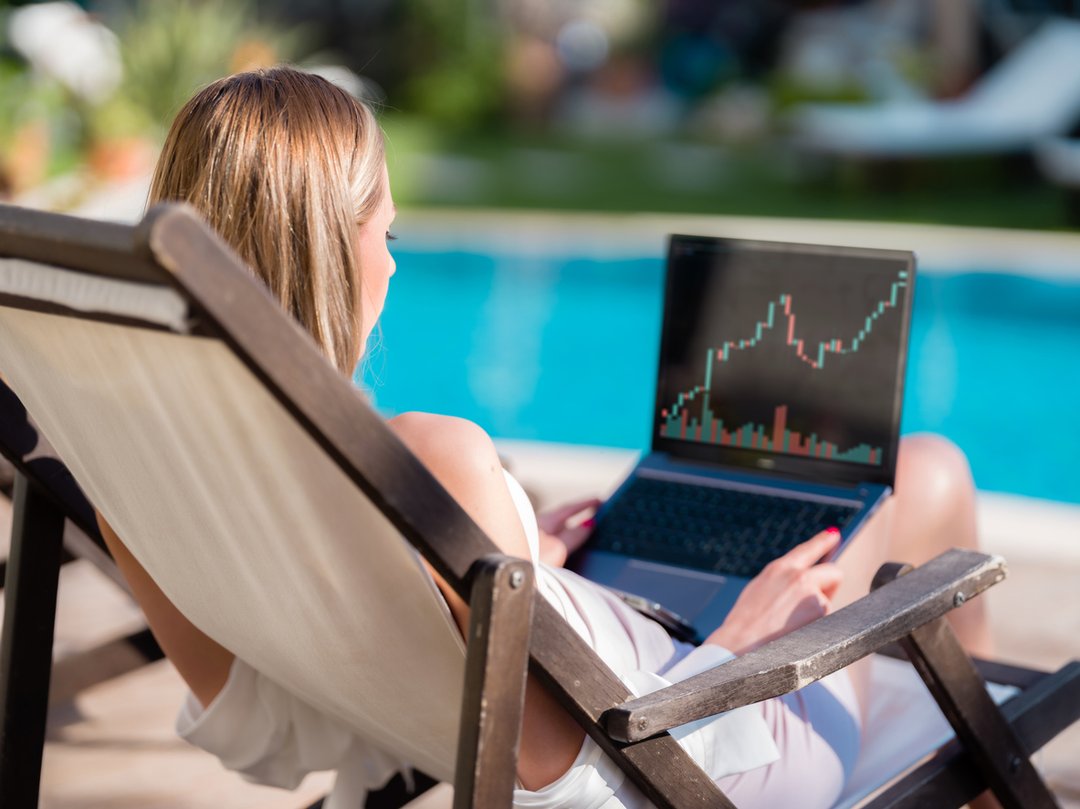
Stuart Kirk
July 12, 2024
What could put investors in a better mood to buy than a couple of months of sport and sun? But the season has its pitfalls.

iStock-1397762443
If markets are driven by psychology and emotion, then surely a long summer break interspersed with blue-ribbon sporting events is just the boost my portfolio needs right now.
The northern hemisphere is home to 99 per cent of the world’s public companies by value, hardly less of bonds outstanding — and is about to go on holiday for two months. Billions have cheered the Euros, which climaxes on Sunday. More will watch the Olympics soon.
Both are quadrennial — so it’s a happier year than most. Add Wimbledon, the Tour de France, and endless cricket and baseball. Who won’t have a smile on their face by a pool, margarita in one hand, sporting glory via mobile in the other?
Asset prices have to rise! Just writing the above makes me want to rush out and buy US equities again — 50 per cent overvaluation be damned. But the reality is that being tanned and relaxed doesn’t help stocks. Indeed, they do worse over the summer.
Consider the MSCI World index over the past 30 years, and let’s define the northern vacation period as July and August. What is more, most big sporting events land in one or both of these months — certainly two-thirds of the World Cups and six out of the past seven Olympics.
The average long-run monthly return for this global benchmark is 0.6 per cent, or about 7 per cent annualised. July and August combined, however, have only managed to deliver 0.15 per cent on average over the past three decades.
That is a huge difference, akin to 5 per cent a year in lost performance if you gross it up. Based on my retirement fund, it’s equivalent to taking my wife and four kids to Sugar Beach Resort in St Lucia every year and bagging the four-bedroom ocean-view villa.
And it is not just that the holiday season underperforms on average compared with the rest of the year, when you would expect equity investors to be full to the brim with animal spirits, as John Maynard Keynes liked to call our “non-economic” frame of minds.
As the summer days blur on, it seems, when we’ve happily forgotten our network passwords and what it’s like to wear shoes, the more impatient we become with global stocks — not less. Of the 50 biggest daily falls in the MSCI World index since 1994, August had seven, almost double what you’d expect.
There is no public data on team rotas or corporate holiday plans. However, in my experience of running money, the more junior portfolio managers would take their (shorter) breaks earlier in the summer. And if you had no kids, sorry — you can go in September, if ever.
The lead managers would then disappear to their second homes around the Mediterranean later on, say the end of July at the earliest. They would go for longer, too, as they fought the losing battle against never-ending private school holidays.
Hence the joke across my industry in August was that the adults were gone and kids were in charge of the funds. At least anecdotally, there seemed to be more “crises”, with emergency meetings about missed earnings, cut dividends or merger gossip.
While it is true that less experienced investors believe everything is crucial (oldies have long stopped trying to understand why they outperform in some years and underperform in others) there is little in the numbers to suggest youngsters panic more.
For example, the implied volatility of US stock prices over the past 30 years, as measured by the Vix index, is lower in July and August than the monthly average. A similar measure for bonds shows no difference at all, while euro-dollar movements are way more chilled over the summer.
Those in the hot seats in August may not be any more volatile but what we do know for sure is that, for whatever reason, they are more inclined to sell or perhaps they are simply less lucky — which in investing amounts to the same thing.
Forget the adage of selling in May and going away, which only works if you manipulate for how long ‘away’ is
Daily summer stock returns overall may be a quarter of those for the year, but they are insanely skewed. July is Formentera to August’s Mykonos. Indeed, the former’s average monthly return — at 1.2 per cent — is twice the global index’s.
So forget the adage of selling in May and going away, which only works if you manipulate for how long “away” is. “Buy in July to fund your August getaway” (it rhymes with a Birmingham accent) is far more rewarding.
What to do then? There are a few weeks left in this month to make some money. I still need to buy either a private equity exchange-traded fund or an investment trust with similar exposure. My energy fund is also down 6 per cent over the past three months, so maybe I should top that up.
It all seems a bit silly, though, with August around the corner. I can see those junior fund managers sweating into their Bloomberg keyboards already. Might it not be better to use any downturn next month to buy something more cheaply?
One thing I’ve been working on is non-“Magnificent Seven” earnings in America. With all the focus on AI stocks these days, few have noticed that second-quarter earnings growth for the other 493 companies in the S&P 500 should turn positive for the first time in six quarters, according to Bloomberg data.
I missed the latest run in the Apples, Nvidias, Microsofts and Alphabets. But that doesn’t mean the rest of corporate America has to get away from me. Something to ponder between wingfoiling and listening to the cricket. Enjoy the hols!
The author is a former portfolio manager
Any trades discussed in this column will not take place within 30 days of its publication
Copyright The Financial Times Limited 2024
© 2024 The Financial Times Ltd. All rights reserved. Please do not copy and paste FT articles and redistribute by email or post to the web.
This article was legally licensed by AdvisorStream


